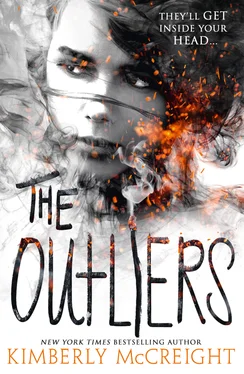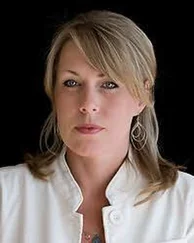Really, Dr. Shepard barely signed off on the home tutor in the first place. Because she knows that my problems with regular school didn’t start that day, four months ago, when my mom’s car spun across a sheet of ice and got sliced in two.
“I’m concerned about where this might lead, Wylie,” Dr. Shepard said in our last face-to-face session. “Opting out of school is counterproductive. Giving in to your panic will only make it worse. That remains true even in the midst of your very legitimate grief.”
Dr. Shepard shifted in her big red armchair, which she always looked so perfect and petite sitting in, like Alice in Wonderland shrunk down to nothing. I’d been seeing Dr. Shepard on and off—mostly on—since middle school, almost six years, and sometimes I still wondered whether she really was a therapist at all; someone that small and young and pretty. But she had made me better over the years with her special therapy cocktail—breathing exercises, thought tricks, and lots and lots of talking. By the time high school started, I was pretty much just a regular kid on the nervous side of normal. That is, until my mom’s accident cracked me open and out oozed my rotten core.
“Technically, I’m not opting out of school, just the school building .” I forced a smile. Dr. Shepard’s perfectly tweezed eyebrows pulled tight. “Besides, it’s not like I didn’t try to stay in school.”
In point of fact, I’d only missed two actual days of school—the day after my mom’s accident and the day of her funeral. I even had my dad call ahead to be sure no one treated me weird when I went back right away. Because that was my plan: to pretend nothing had happened. And for a while—a whole week maybe—it worked. And then that Monday morning came—one week, one day and fourteen hours after the funeral—and I started throwing up and throwing up. It went on for hours. I didn’t stop until they gave me antinausea medicine in the ER. My dad was seriously freaked. By the time we were leaving the hospital, he had agreed to the home tutor. I think he would have agreed to anything, if there was a chance it might make me okay.
But even with Dr. Shepard working her best magic, I wasn’t getting much better. And how could I without my mom around to help me see the bright side? My bright side. “You’re just sensitive, Wylie,” she’d always say. “The world needs sensitive people.” And somehow I had always believed her.
Maybe she’d just been in denial. After all, my mom’s mom—my grandmother—had died sad and alone and in a psychiatric hospital. Maybe she didn’t want to believe I was history repeating itself. Or maybe she honestly thought there was nothing wrong with me. Someday my mom might have told me. Now I’ll never know for sure.
I look down at my plate, avoiding my dad’s stare as I push some perfectly cooked asparagus into a sculpted mound of couscous. In a rough patch, my appetite is always the first to go. And since the accident, life is basically one long rough patch. But it’s too bad I’m not hungry. My dad’s cooking is one of the few things we’ve had going for us—he’s always been the family chef.
“You said I could decide when I was ready to go back to school,” I say finally, even though I’m already sure that I will never be ready, willing, or able to return to Newton Regional High School. But there is no reason to break that to my dad, at least not yet.
“When you go back to school is up to you.” He’s trying to sound laid-back, but he hasn’t touched his food either. And that little vein in his forehead is standing out. “But I don’t love you bumping around alone in this house day after day. It makes me feel—it’s not good for you to be by yourself so much of the time.”
“I enjoy my own company.” I shrug. “That’s healthy, isn’t it? Come on, you’re the psychologist. High self-esteem and all that.”
It’s crazy how much less convincing my smile feels each time I force it. There is even a part of me that knows it would be better if I finally lost this argument. If I was forced, kicking and screaming, back inside Newton Regional High School. Because one thing is for sure: being home isn’t making me any better.
“Come on, Wylie.” My dad eyeballs me, crosses his arms. “Just because you like yourself doesn’t mean that—”
There’s a loud knock at our front door then. It makes us both jump. Please, not Gideon —that’s what I think, instantly. Because the last time an unexpected knock came, one of us was ripped away. And Gideon—my opposite twin, my mom used to joke, for how insanely different we are, including that Gideon is a science and history whiz and I’m all about math and English—is the only one of us left who’s not at home.
“Who’s that?” I ask, trying to ignore the wild beating of my heart.
“Nothing to worry about, I’m sure,” my dad says. But he has no idea who’s at the door, or what there might be to worry about. That’s obvious. “Someone probably selling something.”
“No one sells things door-to-door anymore, Dad.” But he’s already tossed his napkin on the table and started through the living room toward the front door.
He’s got the door open by the time I round the corner.
“Karen.” He sounds relieved. But only for a second. “What are you—what’s wrong?”
When I can finally see past him, there’s Cassie’s mom, Karen, standing on our porch. Despite the sickly yellow glow of our energy-efficient outdoor bulbs, Karen looks as coiffed as always—her brown, shoulder-length hair perfectly smooth, a bright-green scarf knotted neatly above her tailored white wool coat. It’s the beginning of May, but we’re locked deep in one of those mean Boston cold snaps.
“I’m sorry to just show up like this.” Karen’s voice is all high and squeaky. And she’s panting a little, her breath puffing out in a cloud. “But I called a couple times and no one answered, and then I was driving around looking for her when I saw your light on and I guess—God, I’ve looked everywhere.” When she crosses her arms and takes a step closer, I notice her feet. They’re completely bare.
“Looked everywhere for who—” My dad has caught sight of them, too. “Karen, what happened to your shoes? Come inside.” When she doesn’t move, he reaches out and tugs her forward, gently. “You must be freezing. Come, come.”
“I can’t find Cassie.” Karen’s voice cracks hard as she steps inside. “Can you—I hate to ask, Ben. But can you help?”
In the living room, my dad guides Karen to a nearby chair. She drops down, body stiff, face frozen. Nothing at all like I’ve ever seen her. Because it’s more than Karen’s clothes that are always perfect. She is always perfect, too. “The Plague of Perfect,” Cassie actually calls her—so thin and so pretty, always with a smile and never a hair out of place. And thin . It’s worth saying that twice. Because according to Cassie, someone’s weight matters to Karen twice as much as anything else. And that could be true. Karen’s never been anything but nice to me, but there is something about the way she talks to Cassie, a sharp edge buried inside her smooth voice. Like she loves her daughter, but maybe doesn’t like her very much.
“Wylie, can you get Karen a glass of water?”
My dad is staring at me. He’s worried about this—whatever it is—upsetting me. The last thing I need is to be more upset; it’s not a totally unfair point. So he’s dismissing me for my own good. As if keeping me from the room could ever keep me from worrying about Cassie now. I’ve already heard enough.
Читать дальше













